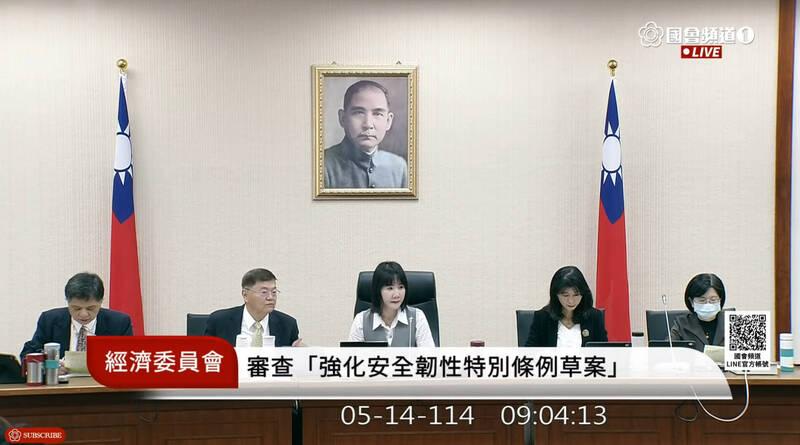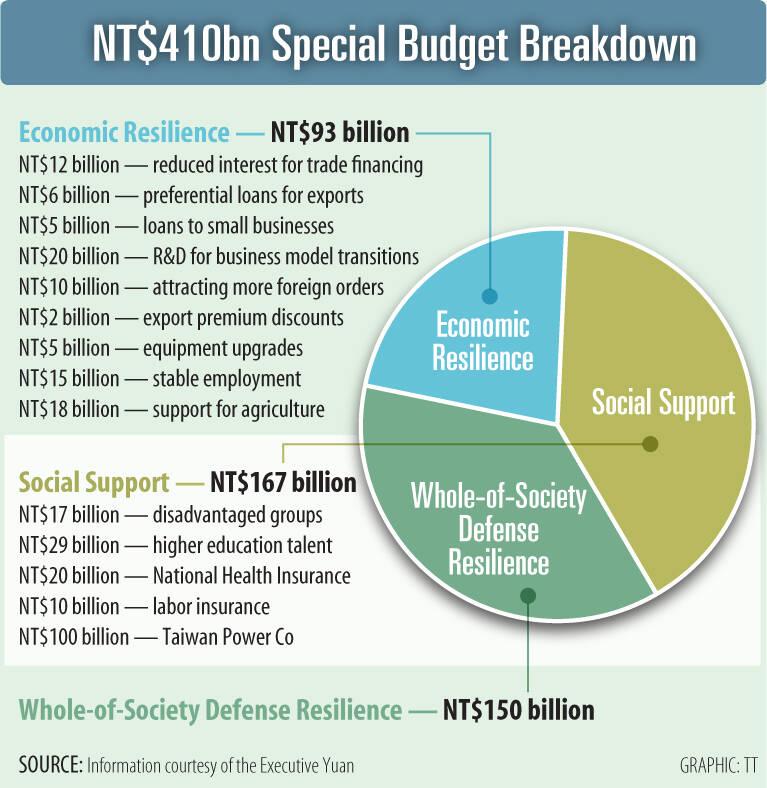The Ministry of National Defense today decried a proposal by the opposition to cut NT$150 billion (US$4.95 billion) allocated to defense resilience from the Executive Yuan’s NT$410 billion special budget request, saying that Chinese threats toward Taiwan could become violent at any time.
The Legislative Yuan’s economic and finance committees jointly reviewed the Cabinet’s special budget today, with the Chinese Nationalist Party (KMT) and Taiwan People’s Party caucuses proposing to cut the portion of the budget intended for “whole-of-society defense resilience.”
The ministry in a report to lawmakers said that enhancing overall defense capabilities and information security is an urgent matter, as China’s threats toward Taiwan have been increasing and it could at any time shift its military exercises to violent aggression.

Photo from Legislative Yuan livestream
The ministry recommended that the budget be retained, as it would provide backup support in the case of military conflict or natural disasters, enhancing homeland security resilience.
In its efforts to infiltrate Taiwan, China often uses cyberwarfare and destroys undersea cables to disrupt Taiwan’s information and communication systems, the ministry said.
Increasing the resilience of these systems is urgent, as China would attempt to paralyze them in a conflict, it said.

Given that a Chinese invasion of Taiwan would likely involve a joint blockade and amphibious assaults, the military needs to prepare enough resources to sustain operations and combat capabilities against enemy sabotage, the ministry said.
Therefore, there is an urgent need for secure storage facilities to stockpile essential resources, it added.
The opposition parties’ proposed tariff response bills do not include any items related to national defense, the ministry said.
Regarding the opposition parties’ proposal for a universal cash payment of NT$6,000 or NT$10,000, the Ministry of Finance yesterday said that the nation’s long-term development needs to be considered to effectively strengthen economic and social resilience.
This requires a rational allocation of resources, so universal cash distributions should be carefully deliberated with this in mind, it said.
Meanwhile, the Foreign Affairs and National Defense Committee today voted to unfreeze NT$1.1 billion of the defense ministry’s budget among the NT$74.4 billion that had been frozen.
The proposal is to now go to the full chamber for a vote.
The 54 budgetary items the ministry requested to be unfrozen include funds to purchase new rifles, Minister of National Defense Wellington Koo (顧立雄) said.
Apart from a request to unfreeze the indigenous submarine budget, as the prototype has not yet finished sea trials, the ministry has already requested that the remaining items be unfrozen, Koo said, urging legislators to quickly review the reports, as if the budgets are not unfrozen by the end of this month, it would “seriously impact” the ministry’s operations.
Additional reporting by Chen Hsing-hung and Huang Ching-hsuan

The manufacture of the remaining 28 M1A2T Abrams tanks Taiwan purchased from the US has recently been completed, and they are expected to be delivered within the next one to two months, a source said yesterday. The Ministry of National Defense is arranging cargo ships to transport the tanks to Taiwan as soon as possible, said the source, who is familiar with the matter. The estimated arrival time ranges from late this month to early next month, the source said. The 28 Abrams tanks make up the third and final batch of a total of 108 tanks, valued at about NT$40.5 billion

Two Taiwanese prosecutors were questioned by Chinese security personnel at their hotel during a trip to China’s Henan Province this month, the Mainland Affairs Council (MAC) said yesterday. The officers had personal information on the prosecutors, including “when they were assigned to their posts, their work locations and job titles,” MAC Deputy Minister and spokesman Liang Wen-chieh (梁文傑) said. On top of asking about their agencies and positions, the officers also questioned the prosecutors about the Cross-Strait Joint Crime-Fighting and Judicial Mutual Assistance Agreement, a pact that serves as the framework for Taiwan-China cooperation on combating crime and providing judicial assistance, Liang

A group from the Taiwanese Designers in Australia association yesterday represented Taiwan at the Midsumma Pride March in Melbourne. The march, held in the St. Kilda suburb, is the city’s largest LGBTQIA+ parade and the flagship event of the annual Midsumma Festival. It attracted more than 45,000 spectators who supported the 400 groups and 10,000 marchers that participated this year, the association said. Taiwanese Designers said they organized a team to march for Taiwan this year, joining politicians, government agencies, professionals and community organizations in showing support for LGBTQIA+ people and diverse communities. As the first country in Asia to legalize same-sex

MOTIVES QUESTIONED The PLA considers Xi’s policies toward Taiwan to be driven by personal considerations rather than military assessment, the Epoch Times reports Chinese President Xi Jinping’s (習近平) latest purge of the Chinese People’s Liberation Army (PLA) leadership might have been prompted by the military’s opposition to plans of invading Taiwan, the Epoch Times said. The Chinese military opposes waging war against Taiwan by a large consensus, putting it at odds with Xi’s vision, the Falun Gong-affiliated daily said in a report on Thursday, citing anonymous sources with insight into the PLA’s inner workings. The opposition is not the opinion of a few generals, but a widely shared view among the PLA cadre, the Epoch Times cited them as saying. “Chinese forces know full well that